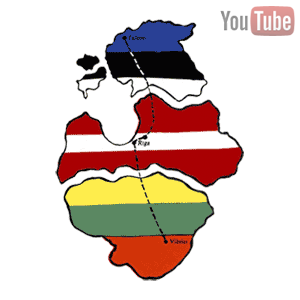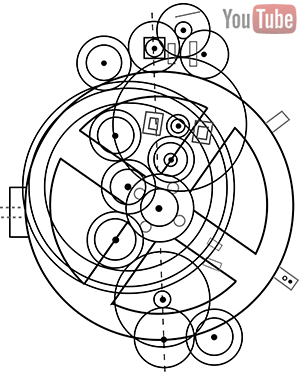A keytar is a relatively lightweight keyboard that is supported by a strap around the neck and shoulders, similar to the way a guitar is supported by a strap. Keytars allow players a greater range of movement compared to conventional keyboards, which are placed on stands. The instrument has a musical keyboard for triggering musical notes and sounds. Controls for pitch bends, vibrato, portamento, and sustain are placed on the instrument’s ‘neck.’ Keytars may either contain their own synthesizers, or simply be controllers, triggering notes on another MIDI capable synthesizer.
In early 1970s, Edgar Winter often performed with keyboards slung around his neck, but they were not technically keytars because they had no ‘neck.’ One of the earliest keytars commercially released and widely known was be the Moog Liberation in 1980. Notable manufacturers of keytar models have included Moog, Roland, Yamaha, Korg and Casio. As of 2010, the Roland AX-Synth and the Roland Lucina are the only mass-manufactured keytars on the market, but with the Synthpop revival of the late 2000s, keytars are enjoying a mild resurgence.
Keytar
Electro
Electro (short for either electro-funk or electro-boogie) is a genre of electronic music directly influenced by the use of funk samples, Roland TR-808 synthesizers, and Moog keytars. Records in the genre typically feature drum machines and heavy electronic sounding deprived of vocals in general, although if present, they are delivered in a deadpan manner, often through an electronic distortion such as vocoding.
This is the main distinction of electro from previously prominent late-1970s genres such as disco and boogie, in which electronic sound was only part of the instrumentation rather than basis of the whole song. In 1982, Bronx based producer Afrika Bambaataa released the seminal track ‘Planet Rock,’ which contained elements of Kraftwerk’s Trans-Europe Express and ‘Numbers’ (from Kraftwerk’s Computer World album). ‘Planet Rock’ is widely regarded as a turning point in the electro genre.
read more »
Straw Man
A straw man argument is an informal fallacy based on misrepresentation of an opponent’s position. To ‘attack a straw man’ is to create the illusion of having refuted a proposition by substituting it with a superficially similar yet not equivalent proposition (the ‘straw man’), and refuting it, without ever having actually refuted the original position.
The origins of the term are unclear; one common (folk) etymology given is that it originated with men who stood outside courthouses with a straw in their shoe in order to indicate their willingness to be a false witness, but the practice is of questionable authority. Another more popular origin is a human figure made of straw, such as practice dummies used in military training. Such a dummy is supposed to represent the enemy, but it is considerably easier to attack because it neither moves, nor fights back.
Baltic Way
The Baltic Way was a peaceful political demonstration that occurred on August 23, 1989. Approximately two million people joined their hands to form a human chain spanning over 600 kilometres (370 mi) across the three Baltic states – Estonian SSR, Latvian SSR, and Lithuanian SSR, republics of the Soviet Union. It marked the 50th anniversary of the Molotov–Ribbentrop Pact between the Soviet Union and Nazi Germany. The pact and its secret protocols divided Eastern Europe into spheres of influence and led to the occupation of the Baltic states in 1940.
The event was organised by Baltic pro-independence movements: Rahvarinne of Estonia, Popular Front of Latvia, and Sąjūdis of Lithuania. The protest was designed to draw global attention by demonstrating a popular desire for independence for each of the entities. It also illustrated solidarity among the three nations. Within six months from the protest, Lithuania became the first of the Republics of the Soviet Union to declare independence.
Antikythera Mechanism
The Antikythera [an-ti-ki-theer-uh] mechanism is an incredibly old mechanical calculator, often described as the first mechanical computer. It was discovered in 1901 in a shipwreck off the coast of Antikythera, Greece. The device was used to figure out the positions of stars in the sky. It was probably made in about 150-100 BC, and is now on display in the Bronze Collection of the National Archaeological Museum of Athens.
Its significance and complexity were not understood until decades after its discovery. The degree of mechanical sophistication is comparable to a 19th century Swiss clock. Technological artifacts of similar complexity and workmanship did not reappear until the 14th century, when mechanical astronomical clocks were built in Europe.
Boomerang Generation
Boomerang Generation is one of several terms applied to the current generation of young adults in Western culture. They are so named for the frequency with which they choose to cohabitate with their parents after a brief period of living on their own–thus boomeranging back to their place of origin. This cohabitation can take many forms, ranging from situations that mirror the high dependency of pre-adulthood to highly independent, separate-household arrangements. In as much as home-leaving practices differ by economic class, the term is most meaningfully applied to members of the middle class.
The 18th through 21st birthdays of this generation coincide with the economic downturn starting with the collapse of the stock market bubble in 2000. This led to rising unemployment until 2004, the same time this generation was entering the workforce after high school or college graduation. Additionally, in the new economy, where globalisation-induced phenomena like outsourcing have eliminated many jobs, real wages have fallen over the last twenty years, and a college degree no longer ensures job stability, this is the easiest, if not only, way for these young adults to maintain the middle class lifestyle they anticipated.
Forest Kindergarten
A forest kindergarten is a type of preschool education for children between the ages of three and six that is held almost exclusively outdoors. Whatever the weather, children are encouraged to play, explore and learn in a forest or natural environment. The adult supervision is meant to assist rather than lead. It is also known as Waldkindergarten (in German), outdoor nursery, nature kindergarten, or nature preschool.
read more »
Helicopter Parent
Helicopter parent is a colloquial, early 21st-century term for a parent who pays extremely close attention to his or her child’s or children’s experiences and problems, particularly at educational institutions. The term was originally coined by Foster W. Cline, M.D. and Jim Fay in their 1990 book ‘Parenting with Love and Logic.’
Helicopter parents are so named because, like helicopters, they hover closely overhead, rarely out of reach, whether their children need them or not. They try to resolve their child’s problems, and try to stop them coming to harm by keeping them out of dangerous situations.
read more »
Appetizing Store
An appetizing store, typically in reference to Jewish cuisine, is best understood as a store that sells ‘the foods one eats with bagels’ ‘Appetizing’ is used as a noun by itself to refer to these type of foods. Appetizing stores includes both dairy and ‘parve’ (neither dairy nor meat) food items such as lox (smoked salmon), whitefish, and cream cheese spreads. These foods are typically eaten for breakfast or lunch and, based on Jewish kashrut dietary laws, include no meat products (kosher fish products are not considered meat).
The simplest distinction is that an appetizing store is a place that sells fish and dairy products, whereas a delicatessen sells meats. It can also can be described as ‘appy table,’ ‘appetizing table,’ or just ‘appy’ (short for ‘appetizing’ in the way ‘deli’ is short for ‘delicatessen.’ The term is used typically among American Jews, especially those in the New York City area. Pareve and dairy restaurants in Toronto, Canada, also have ‘Appetizers’ as part of their name who are both Kosher and Kosher style.
Large Group Awareness Training
The term Large Group Awareness Training (LGAT) refers to self-help ‘training’ offered by certain groups sometimes linked with the human potential movement (a ‘new age’ philosophy founded in the 1960s) . The programs may involve several hundred people at a time for hours or days. It is common for the programs to feature an authoritarian demeanor by the trainer, and to cause physical strains on the participants from a long schedule followed by periods of release and encouragement.
By spending approximately half the time making a person feel bad and then suddenly reversing the feeling through effusive praise, the programs cause participants to experience a stress-reaction and an endorphin high. Over many hours and days the participants are physically exhausted, and made more susceptible to the trainer’s message, whether in the participants’ best interests or not. Examples of LGATs include: Lifespring, Erhard Seminars Training, The Forum, Newfield Consulting, Seres Naturales and Landmark Education.











